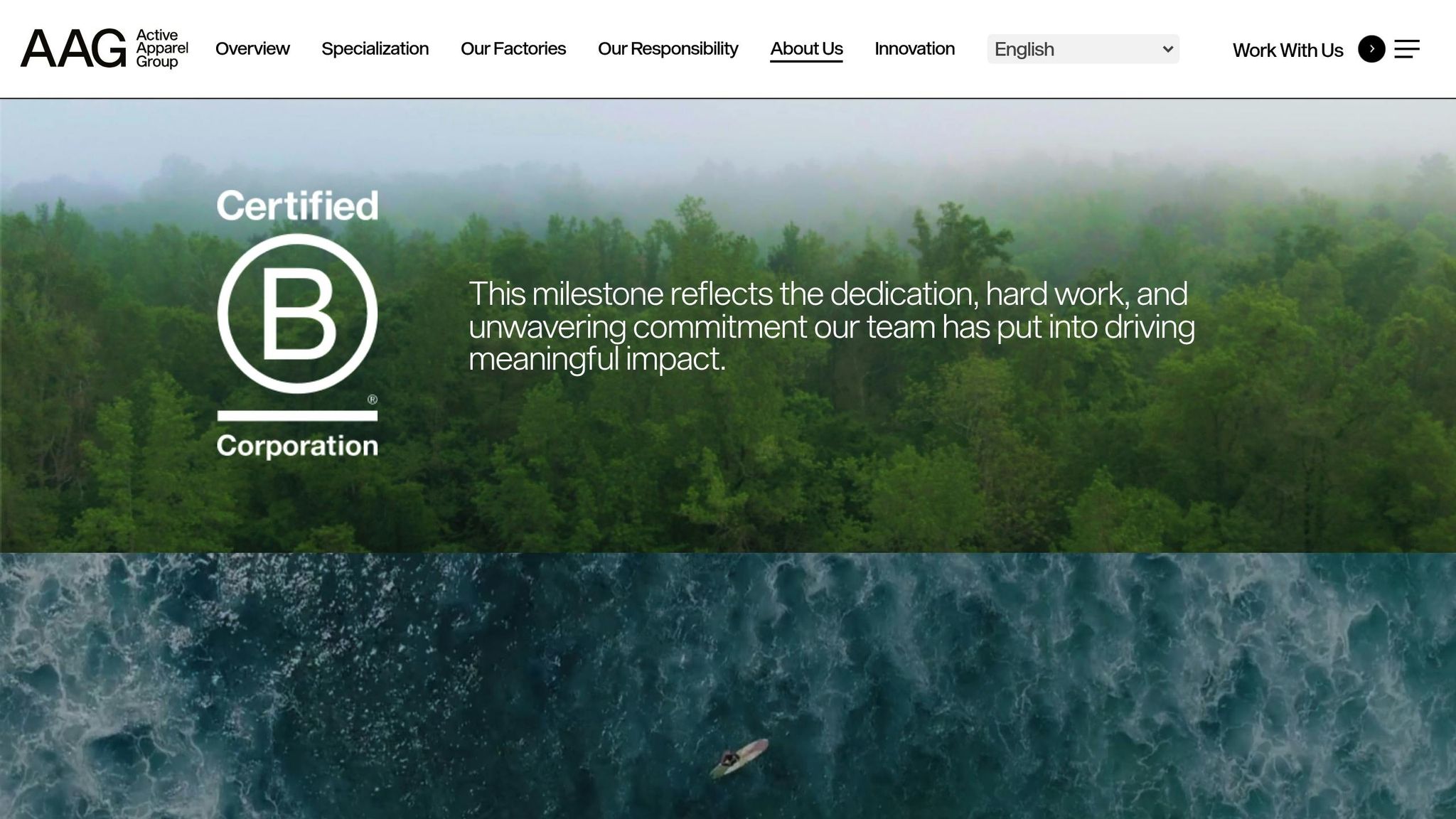B Corp certification is transforming the sports apparel industry by setting strict standards for ethical practices, environmental responsibility, and transparency. Companies must meet rigorous criteria across governance, workers, community, environment, and customers, scoring at least 80 out of 200 on the B Impact Assessment. This process ensures businesses prioritize stakeholder impact over profits, aligning with growing consumer demand for accountability.
Key takeaways:
- Environmental Focus: Companies must reduce waste, use sustainable materials like recycled polyester, and lower carbon emissions.
- Social Responsibility: Fair labor practices, equitable supply chains, and community engagement are mandatory.
- Transparency: Annual impact reports and detailed supply chain disclosures are required.
For brands like Wooter Apparel, B Corp principles offer opportunities to enhance operations through recycled materials, ethical manufacturing, and community programs. While certification is challenging – requiring legal changes, supply chain audits, and detailed reporting – it builds trust, improves efficiency, and attracts conscious consumers.
The push for B Corp certification reflects a broader industry shift toward ethical practices and circular economy models. Companies embracing these changes are better positioned for long-term growth in the evolving sportswear market.
Active Apparel Group HoldCo Pty Ltd – B Corp Highlight

B Corp Certification Requirements
Earning a B Corp certification means meeting rigorous standards that cover a company’s impact across multiple areas. To qualify, businesses must earn at least 80 out of 200 points on the B Impact Assessment, which evaluates their performance using verified documentation.
The assessment focuses on five critical areas: governance, workers, community, environment, and customers. Companies must provide proof of their commitment to these principles, emphasizing stakeholder-driven practices.
Environmental Standards
Environmental responsibility is a cornerstone of B Corp certification, especially for industries like sports apparel, where manufacturing processes can be resource-heavy. Certified companies must demonstrate measurable efforts to reduce their environmental impact.
Sustainable materials and waste management are key priorities. Companies are required to track and report their use of eco-friendly materials, such as recycled polyester or organic cotton. They must also implement programs to cut down on textile waste during production and create take-back initiatives for used products.
Carbon footprint reduction is another critical area. Businesses must measure greenhouse gas emissions across their supply chains annually, set reduction targets based on scientific guidelines, and report their progress using verified data.
Water usage and chemical safety standards ensure companies monitor water consumption and adopt conservation methods. Additionally, they must responsibly manage chemicals, phasing out harmful substances like PFAS from their production processes.
For companies like Wooter Apparel, these environmental standards guide decisions about materials and manufacturing methods, ensuring they align with sustainability goals.
Social Impact and Community Programs
The certification process also emphasizes a company’s social impact, focusing on workforce treatment, community involvement, and equitable supply chain practices.
Worker welfare and fair labor practices are non-negotiable. Companies must implement policies that address wages, working conditions, and benefits. They need to ensure that all workers in their supply chains earn living wages, work in safe environments, and have access to professional growth. Regular third-party audits and transparent reporting are required to maintain accountability.
Supply chain equity is another focus. Companies must prioritize fair treatment for all workers involved in their production, promote supplier diversity, and support minority-owned businesses. Additionally, they are encouraged to invest in programs that drive economic development in manufacturing communities.
Community engagement efforts must go beyond simple donations. Certified companies are expected to create partnerships with local organizations, offer skills training, or design initiatives that address specific community challenges. These programs need measurable outcomes to demonstrate their effectiveness.
Inclusive product design and accessibility require businesses to consider diverse needs. This includes offering products at various price points, designing for different body types and abilities, and ensuring their marketing reflects diverse demographics.
These social and community-focused commitments are supported by strict transparency and reporting protocols.
Transparency and Reporting Standards
Transparency is essential for maintaining accountability in the B Corp certification process. Companies must publicly share detailed reports on their social and environmental performance.
Annual impact reports are a critical requirement. These reports must include clear metrics and progress updates across all areas of the B Impact Assessment. Third-party verification ensures the reports are accurate and comprehensive.
Supply chain transparency involves publicly disclosing details about manufacturing partners, including facility locations, working conditions, and environmental data. This level of openness helps stakeholders understand the broader impact of a company’s operations.
Financial transparency is equally important. Companies must share information about executive pay ratios, profit-sharing programs, and how they balance profit with their social and environmental goals.
Stakeholder engagement ensures that businesses actively listen to and incorporate feedback from their stakeholders. Formal processes must be in place to gather input, and this feedback should influence decision-making and improvement strategies.
These transparency and reporting standards ensure that companies remain accountable not just during certification but throughout their operations, fostering continuous improvement over time.
How B Corp Certification Changes Sports Apparel Companies
B Corp certification pushes sports apparel companies to rethink their operations, steering them away from purely profit-driven models toward approaches that prioritize the well-being of all stakeholders. This shift impacts how these companies connect with customers and transforms their internal processes.
Customer Trust and Brand Perception
Earning a B Corp certification acts as a badge of credibility, signaling a company’s commitment to ethical and responsible practices. For consumers – especially younger groups like Generation Z and millennials – this certification resonates deeply, as they tend to support brands that align with their personal values. The transparency required in the B Corp process strengthens trust and loyalty among these demographics. By prioritizing these principles, companies not only reassure their customers but also set the stage for necessary operational improvements.
Supply Chain and Production Changes
Pursuing B Corp certification often means taking a hard look at the supply chain and making meaningful adjustments. Many sports apparel brands embrace more sustainable materials, swapping traditional polyester for recycled alternatives or organic fibers. Beyond materials, companies frequently implement waste-reduction strategies and adopt made-to-order production models to avoid excess inventory.
Certification also pushes brands to build stronger, more ethical partnerships with manufacturers. Regular audits ensure fair labor practices, safe working environments, and adherence to high environmental standards. These efforts extend to refining production processes, optimizing resource use, and integrating social and environmental metrics into quality control.
Case Study: How Wooter Apparel Could Apply B Corp Principles

Wooter Apparel provides a compelling example of how B Corp principles could be applied in real-world operations. The company’s custom sports uniform business model naturally aligns with sustainable practices, offering opportunities to amplify its impact.
For instance, Wooter’s made-to-order approach already supports a circular economy by cutting down on overproduction. By incorporating recycled materials into their fully sublimated printing process, they could further reduce their environmental footprint without compromising the durability and performance that sports teams expect.
Wooter’s close relationships with sports teams also open doors for community-focused initiatives. They could partner with schools and youth organizations to provide uniforms for underfunded teams, creating tangible social benefits while fostering deeper customer loyalty. Additionally, Wooter could use its custom design services to educate teams about the environmental effects of their uniform choices, positioning itself as a leader in sustainable sportswear.
Finally, Wooter’s competitive pricing ensures that high-quality, customized uniforms remain accessible for teams with varying budgets. By sharing transparent details about their manufacturing processes and partnerships, Wooter can stand out in the custom sports apparel market, earning the trust and loyalty of its customers through responsible and ethical practices.
sbb-itb-4d95ad3
B Corp Certification Challenges and Benefits
B Corp certification comes with its share of hurdles and rewards, particularly for sports apparel companies. While the process requires careful planning and dedication, understanding the challenges and potential benefits can help companies decide whether certification aligns with their goals.
Main Barriers to Getting Certified
The certification process can be resource-intensive, especially for smaller businesses. It involves a significant financial commitment – not just in terms of fees but also in reallocating resources for documentation and compliance. Many companies find they need external consultants to navigate the complex reporting requirements.
Supply chain oversight is another major obstacle. Certification demands that every supplier meets strict standards, which often exposes gaps in supply chain transparency. Addressing these issues can take considerable time and effort.
The scoring system adds another layer of difficulty. Companies must achieve a minimum score across various impact areas, which often requires significant changes to their operations. The detailed review of policies and practices can also be a lengthy and involved process.
Legal adjustments further complicate matters. Certification requires amending a company’s articles of incorporation to account for the impact of business decisions on all stakeholders – not just shareholders. This shift can lead to friction with investors who prioritize financial returns, sometimes requiring extensive negotiations or board approvals.
Despite these challenges, the effort to achieve certification can unlock valuable opportunities for business growth.
Business Growth Opportunities
B Corp certification can deepen customer loyalty, especially among consumers who prioritize ethical and sustainable practices. It can also open doors to new markets, as many organizations prefer to work with suppliers that meet high sustainability standards. In some cases, certification can help secure contracts that might otherwise be out of reach.
The process of certification often leads to operational improvements. By focusing on reducing waste and adopting energy-efficient practices, companies can cut costs while improving sustainability.
Employee retention and recruitment also benefit. Businesses committed to ethical practices often attract and retain talent more effectively, reducing the disruptions and expenses associated with high turnover rates.
For investors, certification signals a strong commitment to sustainability. Impact investors, in particular, are increasingly drawn to companies that meet rigorous standards, and some funds specifically target certified businesses to promote responsible growth.
Finally, B Corp certification can set a brand apart in a crowded market. Companies can highlight their dedication to social and environmental responsibility in their marketing, helping them stand out. The certification process often inspires innovation, encouraging businesses to explore new materials, production methods, and models that align with ethical practices – contributing to the ongoing evolution of the sports apparel industry.
Future of B Corp Certification in Sports Apparel
The sports apparel industry is experiencing a transformation, with B Corp certification becoming a marker of ethical leadership and responsible business practices. This certification is no longer just about sustainability – it’s about setting a higher standard for how companies operate. Advances in technology and materials are steering the industry toward production methods that align with circular economy principles. These changes are unlocking opportunities for innovation and market growth.
New Technologies and Industry Trends
The traditional "take-make-waste" approach is being replaced by a circular economy model that prioritizes eliminating waste, reusing materials, and regenerating natural resources. For instance, biodegradable and plant-based fibers are now enabling products designed for better recovery at the end of their lifecycle. On top of that, digital tracking tools are enhancing supply chain transparency, helping companies meet the rigorous standards required for certification.
Looking ahead, the updated B Corp certification standards (Version 7, expected in 2024) will focus even more on circular economy principles and resource efficiency. This shift makes investing in cutting-edge technologies not just a smart move but a strategic necessity. For custom sports apparel brands like Wooter Apparel, these advancements create an opportunity to embed sustainable practices into their production processes without compromising on performance or quality.
As these innovations take root, they are poised to reshape market dynamics.
Expected Growth in Ethical Sportswear Market
With evolving sustainability standards and the adoption of circular economy practices, the ethical sportswear market is primed for growth. Merging technology with responsible production methods is paving the way for new business models. Companies that prioritize sustainability will not only strengthen their market positions but also contribute to a broader movement toward environmental responsibility in the sports apparel industry.
Conclusion
B Corp certification is making waves in the sports apparel industry by turning ethical business practices into a competitive edge rather than just a box to check. Companies that adopt these standards are seeing real benefits, from improving supply chain transparency to strengthening ties with their communities, all while holding themselves to higher levels of accountability. For custom apparel manufacturers, this balance between sustainability and quality is becoming a key differentiator.
Take Wooter Apparel, for example. By aligning with B Corp principles, the company has the chance to embed ethical practices into its operations without sacrificing the quality it’s known for. Their focus on creating high-quality, customizable products fits perfectly with the certification’s focus on delivering value to all stakeholders. By adopting greener manufacturing processes and building stronger community partnerships, companies like Wooter Apparel can stand out in a market that increasingly values responsible practices.
The shift in consumer expectations and industry standards is clear. Businesses embracing these ethical frameworks are setting themselves up for long-term success as customers reward companies that prioritize responsibility. With concepts like the circular economy and advanced tracking technologies gaining traction, the link between ethical operations and profitability is becoming undeniable.
This change signals a broader transformation in the industry. B Corp certification is no longer just a nice-to-have; it’s becoming essential for companies aiming for sustainable growth and leadership in the sports apparel market. The future belongs to businesses that prioritize doing good while doing well.
FAQs
What challenges do sports apparel companies face in becoming B Corp certified?
Achieving B Corp certification is no small feat for sports apparel companies. The certification process requires businesses to score at least 80 points on the B Impact Assessment, which scrutinizes key areas such as governance, workers, community, environment, and customers. Meeting these standards demands a high level of transparency and accountability – no easy task, especially for companies managing intricate supply chains.
On top of that, the financial challenges can be daunting. Sourcing sustainable materials often comes with a hefty price tag, and implementing ethical practices across operations isn’t cheap either. Add to that the requirement to undergo recertification every three years, and it’s clear that this isn’t a one-and-done effort. Instead, it’s a long-term commitment that demands significant investments in both time and resources. Despite these hurdles, the certification stands as a meaningful benchmark for companies dedicated to ethical and sustainable leadership.
What impact does B Corp certification have on consumer trust and brand reputation in the sports apparel industry?
B Corp certification holds a key position in strengthening consumer trust and boosting brand reputation within the sports apparel industry. It signals a company’s commitment to ethical practices, including social responsibility and environmental consciousness – values that resonate deeply with consumers who prioritize sustainability and equity.
Studies indicate that brands with B Corp certification are often perceived as more reliable and aligned with the values of their audience, leading to greater customer loyalty. While some critics have raised concerns about the certification’s reliance on self-assessment, when implemented thoughtfully, it becomes a meaningful emblem of a brand’s dedication to creating a positive impact.
How can adopting B Corp principles benefit a sports apparel company in terms of operations and growth?
Adopting B Corp principles can be a game-changer for a sports apparel company. By focusing on practices like cutting down on waste, using energy more efficiently, and responsibly sourcing materials, companies can not only lower their operational expenses but also streamline their processes for better performance.
On top of that, earning a B Corp certification signals to ethically minded consumers that the brand is serious about meeting high social and environmental standards. In the competitive world of sports apparel, this can boost the brand’s reputation, build stronger customer loyalty, and even open doors to collaborations with like-minded organizations. These combined benefits can fuel growth and set the stage for lasting success.

